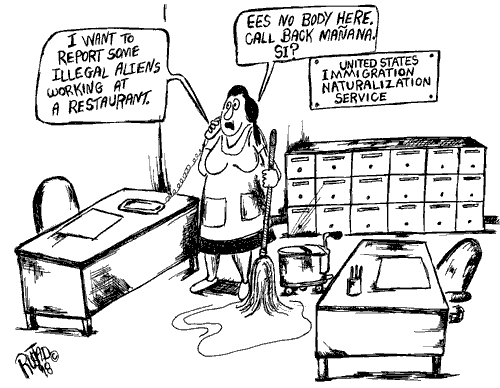
Border Links - Alternate

For my trip to a “border” inside of Phoenix I decided to go to the corner of 32nd street and Greenway. It is a great example of where the U.S. culture and the Mexican culture meet. On one corner are a McDonalds and a Food City (a Mexican grocery store). On another corner is a Shell oil gas station right next to “Flor Michoacan” a Mexican ice cream parlor. Yet at another corner is a Taco Bell/Pizza Hut and adjacent to it is a “Los Betos” Mexican food restaurant. You can not help but notice the blending of the two people.
While I was sat in front of Food City I ran into a woman that I knew, her name is Marta and she is a friend of my mothers. I asked her a few questions and she told me how she had gone home to Mexico for the Holidays. She told me she is from Chihuahua and getting back across into the U.S. illegally is horrendous. She had to cross illegally because due to the September 11th attacks all immigration reform has been postponed (pg. 10 Border Links Packet). She told me she had to walk for 26 hours straight, all the nails on her toes fell off, her feet were bloody stumps, she was almost raped and she almost died of exhaustion. She said that she really misses her family and she wishes her daughters could come to the U.S but she would never want her daughters to go through what she had to endure.
Marta and I spoke for a few minutes and she mentioned how some of her friends had already become citizens. I asked her why she doesn’t just apply as well and she mentioned that her friends had taken advantage of the amnesty of 1986. What she was referring to is Immigration Reform and Control Act (IRCA) which legalized “more than 3 million undocumented immigrants…2.3 million of those who (were) legalized are Mexican citizens” (pg. 9). Back then Marta said that she never would have imagined that she would end up in the U.S. She was married to a wealthy man in Mexico and she thought she was set for life. Unfortunately when her husband lost most of his money he decided to get rid of her and he threw her out on the street. She had no other option but to head north to the US. She now works as a maid in a hotel here in Phoenix.
After Marta left I went to get something to eat. As I sat down at Los Betos I struck up a conversation with a gentleman and his friend. The guys name was Jose and I told him what I was doing. I asked him how he ended up in Phoenix and he told me he used to be a farmer in Mexico. He said that every year his harvest would make him less and less money and that finally he was forced to sell his little piece of land that he had left and he came to the U.S. According to an Article by Steve Suppan entitled “NAFTA’s Impact on Mexican Agriculture and Rural Life” this sad story is an epidemic that is plaguing a large portion of Mexico. Suppan writes “’the Mexican countryside is collapsing, the peasants are in despair…’” Jose now works as a landscaper for $6.50 an hour at a golf course in Scottsdale. He says he gets by but he misses his family.
Another gentleman that I met was named Octavio. He told me that he used to own a small pizza shop in San Carlos. He said that when the pizza companies moved in he lost so much of his business he decided to close shop and come to the U.S. He said he just could not compete with the big U.S. companies anymore. Octavio now works as a dish washer for $6.00 an hour at a local restaurant. He plans to make some money so he can go back home and be with his family.
Interestingly enough Mexico is not the only country to suffer losses due to NAFTA. According to Steve Suppan (on page 9 of the Border Links packet) 500,000 U.S. jobs have been lost due to NAFTA. Tack onto that the 1 million Mexican jobs that were eliminated and that is a grand total of 1.5 million U.S/Mexican jobs. Unfortunately the ones that suffer are not the big corporations; it is the middle or lower class people on both sides of the border.
Another interesting point that was brought up in my research is the fact that the American government pretends that it does not want illegal immigrants but yet American companies gladly hire them for labor intensive jobs. The message seems to be “you can work here…but you just can’t live here.” The corporations that profit from cheap labor turn a blind eye to illegal immigration because they know that it is that same cheap labor that allows them to have such high profit margins. Imagine what would happen to the food and hotel industries in the US without the aid of cheap immigrant labor. The $2.00 burger you enjoy so much would be $9.00 because in order to convince a U.S. citizen to prepare it, cook it and wash the dishes you would need to pay that legal worker $10.00 to $12.00 an hour. This in turn would force the company to either raise all of their prices or go out of business. The same holds true for the $59.95 a night hotel room that so many places advertise; the price would skyrocket to $199.00 because no legal citizen wants to scrub toilettes for $6.00 an hour. Say goodbye to that family vacation, and all the other revenues that are generated from the travel and tourism industries. The Mexican immigrant is so heavily infused in the U.S. market that his or her removal would result in an economic crisis.
Ultimately what I learned on my “trip” and in my research is that the U.S. pretends that they do not want illegal immigrants but in reality they immigrant has helped the U.S economy. American companies exploit Mexican land, workers and environment and there is no one there to control them. NAFTA has done more hurt than help the average Mexican and American and with the implementation of the Free Trade Areas of the Americas (FTAA) in the near future things do not look like they will take a turn for the best anytime soon (globalexchange.org).
